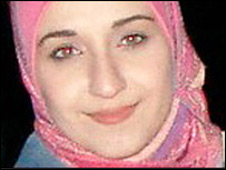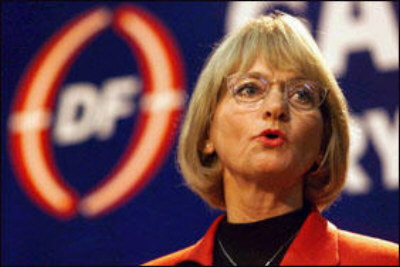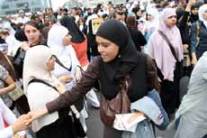 “Discrimination in all its forms is unacceptable. The Zeitgeist is Islamophobia and given this fact we applaud young Bushra Noah’s determination to seek justice.
“Discrimination in all its forms is unacceptable. The Zeitgeist is Islamophobia and given this fact we applaud young Bushra Noah’s determination to seek justice.
“A lot of nonsense has been said by people who ‘wouldn’t get their hair cut from a hairdresser who’s hair you can’t see’. Well there are a lot of bald hair dressers out there such as Trevor Sorbie and you don’t see customers fearing they are about to shave their heads.
“The attacks on Bushra are nothing other than Islamophobia unleashed against a young Muslim female trying to earn an honest living.”
Over at the increasingly demented Harry’s Place Brett Lock of OutRage! offers his entirely predictable take on the case:
“Why should a hairdressing salon carry even the risk of losing business because an irrational third party who as [sic] decided that showing hair is sinful and thus must be covered up at all times wants to work in the trade? Surely the the person making bizarre lifestyle choices based on their irrational fears and superstitions should carry the consequent risks and inconveniences – and and not expect someone else to?”
Lenin’s Tomb hails Bushra’s victory as “a boost for workers everywhere, particularly female workers who are often the target of sexist dress code policies that insist they wear a skirt and so forth. Previous challenges to such policies have been difficult to sustain, but this lays down a precedent. So, not just a victory against blatant employer Islamophobia, but also something that working people will find useful if they want to challenge their employers on discriminatory dress codes.”

 The owner of a hair salon has been ordered to pay £4,000 compensation to a Muslim stylist who was turned down for a job because she wears a headscarf.
The owner of a hair salon has been ordered to pay £4,000 compensation to a Muslim stylist who was turned down for a job because she wears a headscarf. Pia Kjaersgaard’s Danish People’s Party has a genius for attracting attention. Over the past month its campaign to ban public employees from wearing Islamic headscarves has dominated the headlines and also triggered squabbles within most of the country’s other political parties.
Pia Kjaersgaard’s Danish People’s Party has a genius for attracting attention. Over the past month its campaign to ban public employees from wearing Islamic headscarves has dominated the headlines and also triggered squabbles within most of the country’s other political parties. BRUSSELS — The decision of a Brussels school to deny Muslim girls the right to wear hijab has motivated them to champion a protest campaign, the latest episode of the hijab debate in the European country.
BRUSSELS — The decision of a Brussels school to deny Muslim girls the right to wear hijab has motivated them to champion a protest campaign, the latest episode of the hijab debate in the European country.